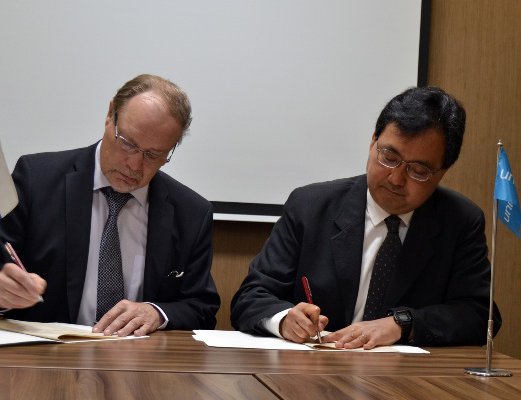
One month after the first of two major earthquakes hit Nepal, an estimated 70,000 children under five are at risk of malnutrition and require urgent humanitarian support - according to UNICEF.
Around 15,000 children in 14 of the worst-hit districts need therapeutic foods – like nutrient-rich peanut paste – for the treatment of severe acute malnutrition. Additionally, some 55,000 children with moderate acute malnutrition require supplementary feeding and care to bring them back to healthy growth and development.
“Before the earthquake, more than 1 in 10 children across Nepal were already suffering from acute malnutrition, while close to 4 in 10 had stunted growth due to chronic under-nutrition,” says Tomoo Hozumi, UNICEF’s Representative in Nepal. “Now we have serious concerns that the situation could deteriorate in the wake of this disaster and undo the gains in nutrition that this country has achieved in the past few years.”
“We are working double speed with our partners to provide urgent feeding and care to protect the lives of these children and to build their resistance against diseases, especially water-borne diseases, during the upcoming monsoon season.”
UNICEF is working with national and international partners and the government of Nepal to deliver a comprehensive nutrition response that includes:
Protecting and promoting breastfeeding for children under two years of age – a lifesaving intervention, providing essential micronutrient supplements for more than 120,000 children and counseling mothers and families on how to feed young children with family foods.
Supporting community screening to identify children with severe acute malnutrition in affected districts, delivering specialized ready-to-use therapeutic foods to treat over 3,000 children with severe acute malnutrition in their communities.
UNICEF is working through Radio Nepal and 111 local and private radio stations to deliver life-saving information on maternal and child nutrition to 380,000 families and is launching a week-long campaign by mid-June, before the monsoon rains, to provide a package of six essential nutrition interventions - including vitamin A supplements and deworming prophylaxis - to over 350,000 children.
Across nearly two dozen districts affected by the earthquake 1.7 million children remain in urgent need of humanitarian aid – with the risk of long-term physical and emotional conditions climbing.
“We are already seeing a growth in chronic conditions – such as children with acute respiratory infections provoked by the dust from the debris in the towns and villages,” says Tomoo Hozumi.
“Children will also be living with long term disabilities as a result of injuries sustained in the earthquake, as well as anxiety problems.”
Over the past month, UNICEF has mobilized a substantial aid response to help children in urgent need, including: Supplied clean water to over 305,109 people and adequate sanitation and hand washing facilities to over 45,201 people.
Gave 10,000 children in displaced communities access to Child Friendly Spaces and provided nearly 9,000 children and more than 2,000 parents with Psychosocial First Aid.
UNICEF also vaccinated over 3,000 children aged 6-59 months against measles and rubella in an ongoing campaign in the most affected districts.
“A lot has been done, but much more needs to be done urgently,” says Mr. Hozumi. “The road to recovery for Nepal may be a long and challenging one, but UNICEF will be there, however long it takes to help Nepal’s children bounce back to a better and brighter future.”
“We need all the support we can get, as the support we give now will have long-term consequences that will impact generations to come.”
- TANAHU HYDROPOWER PROEJCT: A Significant Achievement
- Apr 15, 2024
- AMBASSADOR HANAN GODAR: Sharing Pain With A Nepali Family
- Mar 30, 2024
- VISIT OF KfW AND EIB TO NEPAL : Mission Matters
- Mar 25, 2024
- NEPAL BRITAIN SOCIETY: Pratima Pande's Leadership
- Mar 24, 2024
- NEPAL ARMY DAY: Time To Recall Glory
- Mar 15, 2024
















